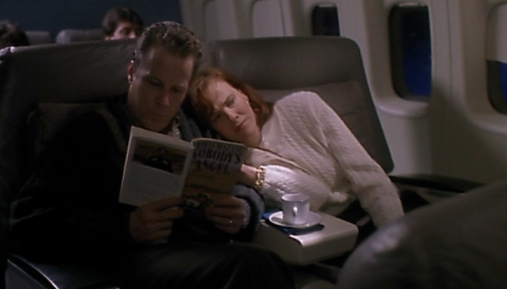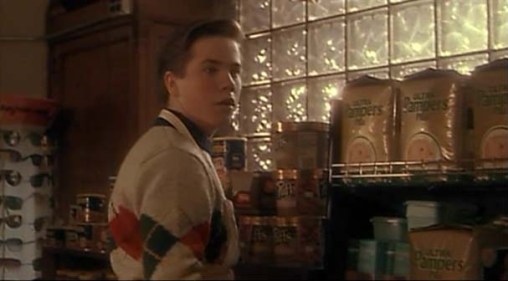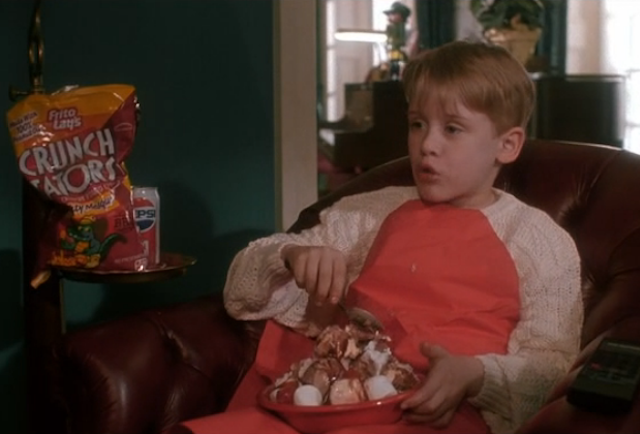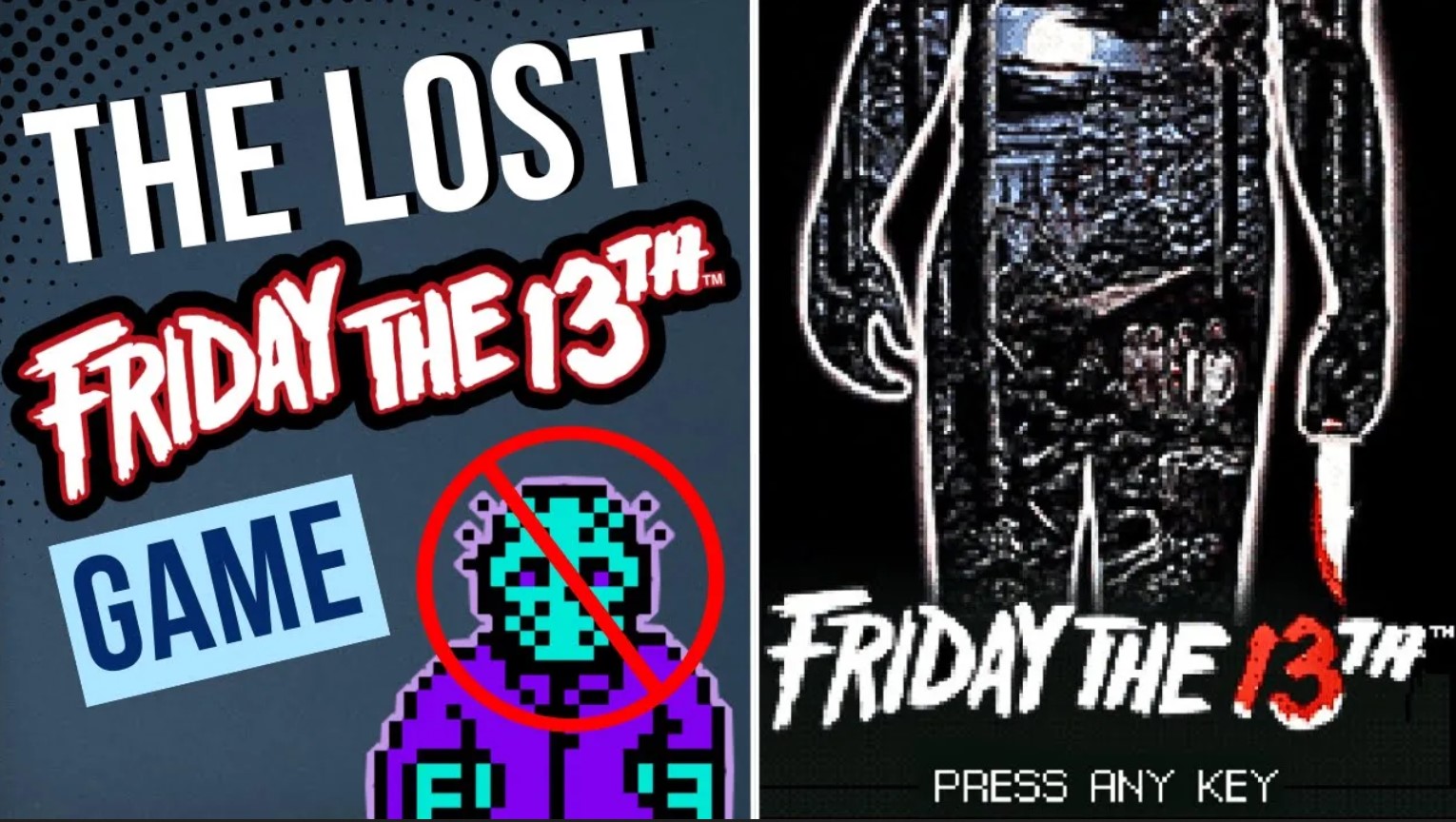Please don’t misconstrue this article as an attempt to tear down a beloved film.
The blessing and curse of a film studies degree is that you notice everything in a movie. You catch every flourish of music, editing, sound effects, photography, etc contributing to the effect, or intended effect, of every moment in a film. Even ones that aren’t high up there on the greatest works of cinematic art list, but high on the entertainment value list. I love Home Alone as much as anyone else who claims to. I just happen to love it in the same way I love Black Christmas or Silent Night, Deadly Night.
I’ve long thought that if you removed Jigsaw’s mask, you’d find that it was Kevin McAllister from Home Alone. Over the years a few people have come to this conclusion as well, but not many. Of course once you’ve seen the second film and seen how Kevin’s transformation of a home into a giant Rube Goldberg contraption designed for torture, and holiday hallmarks into instruments of pain, escalated like a serial killer who moves from torturing animals to people, it’s virtually indisputable. Take for instance this DRYVERS sketch that broke the internet recently, about the twisted psychopath that Kevin McAllister became:
There are plenty of movies that use as inspiration the tradition of the holidays bringing together family members who spread apart for very good reasons, and creating a storm of negativity that the magical power of the holiday is supposed to eradicate. With the recent release of Krampus in movie theatres reminding us what a monster the perversion of the holiday season’s magic (by selfishness, greed, commercialization, and torture inflicted by ungrateful family members) can conjure; I felt it was the perfect time to break down this Christmas classic again. Kevin is a lot like the emotionally devastated little boy in Krampus who sparks the evil spirit to visit by abandoning all hope that his family will learn to love and be loved (by tearing up his letter to Santa and throwing it into the wind).
Now there’s plenty going on in Home Alone once you really dig into it-a straightforward picture of the social construction of masculinity tied inherently to violence, the dark magic of a mother-child bond turned sour, and the inherited powers of a child that makes disturbing dreams a reality. Not to mention some of the worst parenting and lack of basic decency and common sense ever displayed on screen.
Now let the holiday bitch-fest begin!
The twinkling, impish mischief of the main theme right away sets an almost magical tone, hinting at the powers necessary to make Kevin’s Christmas wish a reality. (Is it any coincidence that director Christopher Columbus would team again with his favorite composer John Williams to create a similar theme for the Harry Potter movies, another multi-part story about a child with potentially dark powers?)
Right away, we get a perfect explanation of what a negligent, uncaring, and frankly stupid family this is, ALL of them. Not a single person even remotely questions the presence of a man in a store-bought Halloween costume of a police uniform standing around in their house. In addition, he directly addresses many of the children, and not a single one thinks to mention this to anyone else, let alone another adult.

Kevin’s initial interaction with his parents to open the movie says a lot about the family dynamic. He’s in his parents room as Kate McAllister talks on the phone to a friend, Kevin having been forbidden to watch “Angels With Filthy Souls” with the other kids and their terrible uncle. Dad comes in to literally hand Kevin off into his aunt’s arms when she asks for a voltage adapter that no one remembered to buy. The fact that neither parent has remembered to procure this item, and then hand off their youngest child (presumably because he’s a bundle of energy?) to someone else who’s forgotten the same thing, foreshadows what/who else will soon be forgotten.
Next we witness the loveless and thoughtless siblings (who look like they all have different fathers), and their idiot cousins; so numerous they only have enough time to fight for attention themselves and who delight in not helping the baby of the family pack for an international vacation because they mistake youthful inexperience for stupidity and assume he gets all the attention they must crave (“You know Mom’s going to do it for you.”). If they had witnessed the previous scene they would realize that even without him they’d probably be ignored just the same. They would need to be forgotten and left behind on a family vacation to get any real attention or consideration in this family.

The oldest brother Buzz (a victim of Chris Columbus’ preference to show a character’s inner ugliness in their physical appearance) now tries to scare Kevin with a morbid tale of the neighborhood bogeyman, a benevolent and lonely old man salting the sidewalks outside as they spy on him, planting the seed of a dark energy that could take hold during this precious holiday season.
Joe Pesci’s thief is himself quite stupid, but hindsight is 20/20. Since everyone is ignoring you anyways, why don’t you just rob the house now? You could have murdered half the family and stolen the jewels and stereo already!

It’s not until the pizza delivery boy comes in, also without having to wait for someone to answer the door, that an adult pays attention to the strangers in the house. Also, this is the first time we see the statue on the front steps knocked over by a car skidding on the ice as it speeds in a time crunch. This moment is repeated throughout the film, and again in the second, suggesting something symptomatic of the home’s dark magic that compels this whole family to learn nothing and repeat their mistakes, and remain stuck in this cycle forever, or at least as long as the concept was marketable.

It’s the cheapskate uncle who only has space in his brain for how not to spend money or love anyone but himself who takes the pizza and heads for the dining room/kitchen. Then the homeowner Mr McAllister shows up and also doesn’t question how these two non-family members got inside, doesn’t pay the pizza guy, and offers the stranger in a police outfit some eggnog before wandering off too. That the pizza is ordered from Little Nero’s suggests that little son Kevin is on a dark path tonight.
Having established the callous disregard the family holds for Kevin, everyone else’s preference for pizza was honored except his. (Buzz says all the plain cheese was eaten, but no one has any on their plates, leaving us the audience to surmise that out of 12 pizzas ordered, not one was for the family member most in need of help procuring nourishment). When Kevin fights back at his brother’s jerky behavior, the milk and soda are knocked over causing mayhem around the dinner table.

For some reason, though the parents are concerned about making everyone drink milk tonight so it won’t go to waste spoiling in the fridge while they’re out of town, the passports and plane tickets were left on the counter with the open bottles of all the beverages, and underneath greasy pizza boxes, because that’s just how the important things are treated in this family. With the money they have, which the house and their belongings advertise at every turn, perhaps they assume it can fix any problem.
In the mix of the chaos, one of the American Airlines tickets accidentally gets tossed in the garbage with milk-soaked napkins. This is why later there will be no red flag when all the tickets are checked at the gate, one missing child and one missing ticket = no issues for the airline to worry about. It seems the Krampus-energy is ramping up already.

The entire family erupts in shock and dismay at Kevin and blame him for the mess, even though they made it, and stare him down with intense, hateful, mutinous anger. They call him a “little jerk” and a “disease” before Mama McAllister grabs him by the arm and drags him out of the kitchen. Merry Christmas indeed.
In another sign of intelligence, she pays the pizza man and shares her family’s history and travel plans with Joe Pesci’s phony policeman (who, again, could have cleared out half the house by now since he’s been left alone in the foyer this whole time) before again just walking away as if there’s nothing odd about his poorly-justified presence and the visible glee in his eyes that the house will be left unattended and without surveillance for a long period of time. At least Kevin quizzically observes the twinkle of his gleaming gold tooth, which will come in handy later.
And now for a lesson in top-notch parenting: Dear mama decides to lay all the problems in the house on Kevin (“There’s 15 people in the house, and you’re the only one who has to make trouble”). I guess paying the way for an entire other family’s food and lodging isn’t considered trouble. The sign that there’s no love lost here between mother and son comes when, upon being ordered to get upstairs, Kevin responds “I am upstairs, dummy!”
She means for him to go up to the attic bedroom by himself, despite his fears of the space. Of course part of this film is about Kevin confronting and conquering his fears, but this is where we learn how far he has to go in that goal. Still, his mother “Kate” sends him up there anyways, unconcerned about his emotional well-being. Tiring of being “treated like scum” (a claim that gets less and less possible to negate as the opening scenes wear on) he finally erupts and spills all the T. As if what we’ve already witnessed hasn’t done so, the exchange that follows below is about as effective a conjuring spell for the dark powers of Christmas hell to rain upon them as the dysfunctional gathering in Krampus:
Kevin: Everyone in this family hates me
Kate: Maybe you should ask Santa for a new family?
Kevin: I don’t want a new family, I don’t want any family. Families suck!
Kate: Just stay up there, I don’t want to see you again for the rest of the night.
Kevin: I don’t want to see you again for the rest of my whole life. And I don’t want to see anyone else either.
Kate: I hope you don’t mean that, you’d feel pretty awful if you woke up tomorrow and you didn’t have a family.
Kevin: No I wouldn’t.
Kate: Then say it again, maybe it’ll happen.
Kevin: I hope that I never see any of you jerks again!
First of all, what parent says these things in response to these very disturbing thoughts from their youngest child? You hear your child say everyone in the family hates him, and instead of reassuring him that’s not true, during the holiday season, you confirm it is true by suggesting he should ask for a new one? As if asking to repeat an incantation to solidify the power of the spell, she asks him to repeat his childish wish that they all disappear. Then he repeats it for a third and fateful time, in his own head, once he’s alone in bed.

Cut to a full moon overcome by dark clouds as a powerful wind blusters around the house, a plastic Santa rolls down the street like a tumbleweed, a red bow comes flying off the lamp post, gnarled branches knock at rattled shutters, and the camera zooms in on the Santa wreath flying around on the front door, as the light swirls around casting high-contrast lighting to make Santa’s face look ominous rather than cheerful. The hot air of the awful McAllister family is blowing the Christmas spirit right out of there, like the twister that takes Dorothy to Oz. Is Krampus here yet?
Kevin’s spell has created a perfect storm to make it come to fruition-the snapped limbs of barren trees knock out the power and phone lines-so the alarm clock shuts off and no one can call to wake them up. All the elements are in line for Kevin to be forgotten. Kevin’s spell also erases the oldest cousin’s ability to count when entrusted to do so, to make sure everyone is there (she counts herself twice, AND an annoying child from next door who has come to rummage through their bags and annoy the shuttle drivers and still comes to the correct number of children).

The scene where Kevin awakes from his slumber to find the house empty troubles him at first…until his memory fires up and starts spitting out images of his family saying horrible things to him the night before (and one totally imagined threat from Buzz), reminding him that it’s possibly the best present he could have asked for. Naturally, his memory is tinged with his emotional reaction to these incidents, so these images are not replays but reshot versions of those moments with even more menace and antipathy in the line readings and facial expressions, in the extreme close-up thought-bubbles coming out Kevin’s head.


It’s here where the notion of what is acceptable behavior for a boy starts to stretch the limits.
At first Kevin does what any normal child might do when free of parental control. He runs screaming “FREE” around the house (okay not quote so normal), jumping on the bed, eating junk food, riding his sled down the stairs, watching forbidden movies, going through his older brother’s off-limits bedroom.
Yet then his play turns to shooting at plastic army men perched on the laundry chute ledge so their fake corpses tumble down into the basement after being shot. Shades of H.H. Holmes’ “Castle” anyone?
Great pains are taken to show how unlike a grown boy Kevin is-he’s scared by the story about the old man in the neighborhood; he’s offended, and his curiosity not piqued, by the Playboy magazine in Buzz’s room, and he’s scared by the insane mobster in the movie shooting up his accomplice with a Tommy-gun. It’s not until he feels he has grown up (“I can’t be afraid, I’m the man of the house”), by ordering his own pizza, using aftershave, or defending his home, that he learns how to harness the power of violent spectacle. Hence playing with an air rifle is seen as similarly normal childish behavior for him, like Ralphie and his Red Ryder carbine action air rifle (though in today’s world you’d think a Christmas story about a little white boy who manipulates the holiday season into getting his parents to buy him a gun should be more unsettling than it is).

It’s when Kevin is frightened by the movie that he cries out for his mother. Here’s where the magical bond that exists only between mother and child comes into play, as his fear and resultant need for her transcends the boundaries of time and space, to reach her in her first-class seat to Paris long after the plane has taken off. It is only she that feels the worrisome knot inside that tells her something is wrong.

The father has no such connection to his children, acting like a man whose only contribution as a parent so far has been sperm and money. So he writes off her feelings as the worried wifey’s feminine foolishness. Until we see where Kevin’s screaming tendency comes from as she remembers that he’s what they forgot. This realization of that magic turned sour (“What kind of mother am I?”) precipitates the arrival of the “Wet Bandits” to the McAllister home, like agents of Krampus come to deliver unholy rewards and collect the poison of this family’s love for their own sustenance.
When the McAllisters arrives in Paris, instead of asking to use a phone elsewhere, they substantiate the stereotype of self-absorbed Americans by ripping a payphone out of a French woman’s hands, expecting everyone else to cope with their problems.
The callousness at the beginning of the movie carries over into the Chicago police department who transfer her back and forth, who are not the least bit concerned by the fact that a child has been abandoned by his family a continent and ocean away, and left to fend for himself. Not only do they not report it to any kind of department of child welfare, they send a jaded old cop, eventually, to check the house merely by pounding on the front door and not announcing who he is or why he’s there, as if any child left home alone would answer the door in that scenario.

Back in Paris, the pretty American Airlines rep is reassuring them that depite their best efforts she has nothing to offer our beleaguered McAllister clan, who are doomed to forever run in circles in airports around the world. Of course, she’s actually done nothing at all. She does offer the opportunity to wait in the luxurious accommodations of the chairs in the terminal to wait on stand-by in case a seat opens up (so really, again, they’ve done nothing). The film is loaded with advertising for different products and services, but American Airlines doesn’t come off too well here.
Kevin being forced to become an adult before his time occurs gradually. It is part of this growth in which Kevin learns to incorporate enjoying violence into a socially acceptable construction of boyhood masculinity as he uses the movie scene that scared him earlier to terrify the pizza delivery boy with the threat of death by machine gun for complaining about a $0.20 tip. Then as he readys himself in the mirror after a shower he uses aftershave that burns his skin (eliciting the famous Munch scream pose that sold the movie in every market across the world), learning that a key to being a man is learning to endure needless pain one inflicts on themselves to prove their strength.
Then this burgeoning adulthood/manhood gets a more turned around when he goes shopping for a toothbrush. Kevin annoys the old sales clerk of the cleanest Mom-and-Pop corner store ever seen by asking if his toothbrush is approved by dentists everywhere. Here we see a flipped vision of Columbus’ American male as Kevin runs in fear (with toothbrush still in hand) from the neighborhood boogeyman with a fresh wound on his hand who comes into the same store. “Jimmy” a paragon of healthy, wholesome, apple-cheeked young American masculinity is dispatched by the crusty old cougar to chase down the child. Jimmy calls on a fat old cop (“SHOPLIFTER”) to chase Kevin down. Needless to say Kevin escapes these dullards with relative ease.

Next Kevin is nearly run over by the Wet Bandits, as they leave another home they’ve broken into and cleaned out, again like Krampus stealing into homes to make off with families’ broken holiday wishes. In another nod to this ancient legend in recent film, they have a collection of snow-globes on their dashboard, taken from various homes they’ve robbed (I won’t spoil what that means for those who haven’t seen the delightfully demented Krampus). When Kevin notices the same twinkling golden tooth and has no poker face to hide the worry brewing in his head. The bandits start following him, afraid they’ve been recognized, and wonder aloud that they were right to be worried by Kevin’s expression. “See I told you something was up, why would he run?” I don’t know Joe Pesci, maybe because you’re trailing a child in a giant windowless van on a street empty of any other adults? So the holiness of this child’s pure love of Christmas joy saves him as he hides as a bystander in the church manger scene, a church being one place the burglars won’t chase him into.
Kevin prepares a fake party in the house to throw off the burglars when they come again to rob the place that night. The abundance of dress forms (is someone in this house a fashion designer, because there seems to be an endless supply of these in this house), a train set, a system of pulleys and clothesline, and a cardboard cutout of Michael Jordan (to remind us we’re in Chicago). If this kid weren’t a psycho his Christmas parties might be fun when he can start serving alcohol.
Meanwhile, back in Paris the McAllister children are “rotting” (their words, the spoiled little shits) in a Paris apartment with a perfect view of the Eiffel tower, lost in worry while watching It’s a Wonderful Life dubbed in French. Dad is screaming at French telephone operators for not speaking English and asking “I’m looking for my son, do you know where he is?!” You know where he is you moron, he’s in Chicago-that’s not the problem. The problem is that you’re not, because you abandoned him there, something the French telephone operators can’t help you address emotionally in either language.
Mom is still at the airport, offering an old woman and her husband a game-show list of prizes in exchange for their ticket to Dallas. The old man begrudgingly accepts her offer (“Oohh alriight”) of two first class tickets to fly Paris to Dallas and arrive on Christmas day, $500 dollars cash, a pocket translator, an expensive (if not Rolex) watch, a ring, and her earrings, as if it were so awful to be paid handsomely to visit family that your curmudgeonly attitude leads me to believe makes them invite you out of guilt rather than love. Besides, if you were in Paris on Christmas Eve anyways, how desperately did you really want to be home in Dallas on Christmas day?
The film has numerous looping motifs as if this Krampus-type energy mangles time (remember the snow globes?). Kevin’s spell robs his family of time to get ready, and thus more easily forget him. Events keeps repeating themselves-hell, Home Alone II repeats virtually every joke and plot element from the first movie as it is. The statue in front of the house being knocked down, Kevin’s showers and scream-inducing aftershave rituals, in addition to the closeups of Kevin screaming out in other scenes; the burglars’ returns to the “silver tuna” that is the McAllister house; Buzz’s escaped tarantula wandering around the house as if it were Kevin’s familiar, his living talisman that extends the reach of his dark witchcraft. Kevin’s use of the murder scene from “Angels With Filthy Souls” to terrify various visitors to the back kitchen door of the McAllister home, such as he does when this all leads to the fateful meeting of child and Krampus agents/Wet Bandits at 9pm sharp. Like the ancient legend, the hallmarks of the holiday, (and like the film, children’s toys), are transformed into dark omens. Christmas ornaments, ice and snow, all become tools of Kevin’s defense against violent criminals.
Now is when the escalating violence in Kevin himself should worry us, but instead it just entertains us the same way virtually every action hero does with a great kill of a devious antagonist accompanied by a (pseudo) pithy quip. The insane violence of cartoons is clearly an inspiration here-you can practically see Wile E Coyote or Tom Cat suffering the same injuries, injuries that would normally be life-ending. I always thought Jerry Mouse was just as violently psychotic, taking tremendous glee in the suffering he causes, and Kevin totally fits the bill. If you want to play a drinking game and ensure none of your guests will leave sober-take a swig every time one of Kevin’s booby traps or attacks should have killed the burglars. Everyone will be blasted in 10 minutes.
Let’s run down what Kevin does here. He has not only attacked these guys, he has created Saw-like predicaments that encourage these men to hurt themselves more. It’s WAY more apparent in Home Alone II, but in evidence here as well. It all depends on the stupid burglars acting in very specific ways, but it’s particularly vicious in Marv’s case (the coyote/Tom to Kevin’s Roadrunner/Jerry), who bears the brunt of the majority of the violence.
The violence is made cute because some of the weapons are little-kid ideas (super glue and feathers) or little boys’ toys, like the MicroMachines, which his father warned Kevin about at the beginning of the movie (they were left out and nearly killed another family member who slipped on one, something that prompts me to believe that his leaving them spread out on the floor for people to slip on was never accidental and exemplified his early murderous tendencies).
Then it’s his cleverness that delights instead of horrifies, even as the consequences of characters sliding down icy cement steps makes us cringe in pain.
Thrillist took all the conversations I’ve had with medical professionals over the years about this film and its sequel and made a handy article article out of them-asking a doctor to explain just how bad many of the injuries Kevin inflicts would be. They get some details about the films wrong but it’s a great resource for anyone who has obsessed over how gloriously insane these movies are.
It’s not just that the consequences of the violence are way more damaging than what the burglars experience, that makes this unnerving. It’s the maturity and creativity of the sadism on display.
The rope from the attic to the treehouse is constructed to entice the burglars to travel hanging hand over hand, before Kevin taunts them with the giant hedge trimmers before cutting it and sending them swinging into a brick wall. It’s Jerry toying with Tom again.
An even better example is the ornaments positioned under the window. True it needs help plotwise to make it work, but this trap is designed for a barefoot intruder. In essence, it’s set for the person who tried to first enter up the cellar stairs, after the tar has taken their shoes and socks, and the nail has sensitized the feet to pain. That’s a twisted game of chess with a majorly fucked-up Bobby Fisher thinking 12 moves ahead.
Kevin uses these masculine tools of the home to punish the disturbance in the home. Still to this day when you just sit down and watch the Home Alone movies, none of these actions are visualized to frighten or disturb. Nothing feels aesthetically akimbo or even remotely off-kilter. The frames are orderly, symmetrical and well and evenly lit. In contrast, in the movie Small Soldiers which critically questions a lot of this ground in terms of violence being a selling point for toys marketed to little boys, there’s a scene where a girl’s collection of Barbie-like dolls have been animated (to the theme of the creation scene in The Bride of Frankenstein) and attack her and her boyfriend. The girlish toys becoming violent is intended to frighten, and is filmed differently than the scenes of the animated army men throughout the film. Director Joe Dante shoots the deformed dolls from a variety of skewed camera angles and seizure-inducing flashes of light to visually underline the unstable nature of aggression or fearsome strength in anything feminine that fuels the scene’s effect.
Home Alone ends with the reunion of Mother and Son, both having countered unenviable situations to find each other again in a shockingly spic-and-span house. Kevin needed to grow up a little, and Mom needed to remember he existed as something other than a pain in her ass. God help the family when they learn what he’s capable of. Columbus wants to pose the love between mother and child as a powerful magical bond (another precipitous link to the Harry Potter books he would direct onscreen) one that has the power to bridge vast expanses of time and space, but also to drift into painful valleys of darkness. Of course what’s really dark is the man we see Kevin becoming in the future, and the excuses his parents will make when that time comes.
Now that we established the re-balancing of mother and son’s love, the rest of the family arrives, having followed the advice of sensible Dad (the one who doesn’t have the burden of deep emotion) and left two days later to arrive Christmas morning anyways. Silly irrational Mom, driven to make the magic she shares with Kevin teeter back to the light from the shadows she tottered into at the beginning of the movie. This must be the part where they realize they’ve been trapped in hell, forced to relive Christmas over and over again inside a seemingly perfect snow-flocked setting right out of a tacky snow globe.
A few other questions Home Alone always inspires:
Why would the teens and pre-teens in the family even have wanted to watch a black-and-white film noir/OG Scarface knockoff? They don’t seem to have interesting taste in anything.
Why does the family always choose morning flights?
Why were payphones the only way the family could think to make an important call in Charles de Gaulle airport? And how did one quarter would pay for a lengthy international call where Kate is placed on hold multiple times, is a mystery we never solve.
Why would any cop would stop ticketing a luxury auto-driver to catch a child who stole a toothbrush is anyone’s guess. Perhaps incarcerating pre-pubescent toothbrush thieves is more lucrative to the city of Chicago than traffic violations?
How on earth did Kevin clean up the entire house after nearly slaughtering the two burglars with multiple, incredibly messy traps and pranks? You got all those feathers? And did you remember to clean up the tar on the cellar steps? How did you remove the smell of burnt accelerant, hair and flesh from the house? And then you made cookies and set them out with carrot sticks? Then wrapped presents you bought with Buzz’ meager life savings?
How, when every bit of broken glass, every toy car, was swept up, did Kevin miss Harry’s golden tooth, dislodged by the flying paint can?
Why would Kevin actually expect to eat his Christmas dinner of microwave Mac’n’cheese when he prepared it at 8:57pm, three minutes before he expected the burglars to arrive?
Does anyone ever buy the insincere claims of airline employees that they’re “doing everything” they can? Why does the American Airlines employee in Scranton keep offering to book a hotel room as a consolation for not having a seat left to Chicago? What about ground transportation to Chicago? A good deal on a rental car? These employees are clearly doing a LOT less than “everything they can.” If the movie was trying to advertise for AA, it failed miserably. In Part II the same airline boards 9-year old Kevin without a ticket or a guardian, or actually ensuring he has either.
Why does no one attempt to do anything to address the bed-wetting problem of the other Culkin playing a McAllister? Do they all just resign themselves to scrubbing down rubber sheets forever and/or rewashing his urine-soaked sheets every day instead of trying to help him get past this? How close must this family be to their breaking point?
I’m always impressed that despite flying from Chicago to Paris to Dallas to Scranton, and riding in a rented moving van back to Chicago from there, Kate McAllister never lost her house keys or her lipstick.
In Part II, how on earth could the screenwriting get so pathetically poor as to have Kevin halt in the middle of the terminal as the family races to the gate, to frantically… put batteries in his TalkBoy tape recorder as if it were a life and death situation. Really, that was the only way you could figure out to separate him from his family again?











